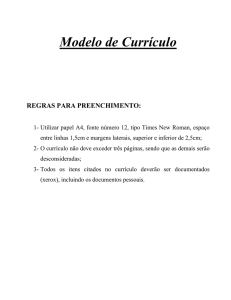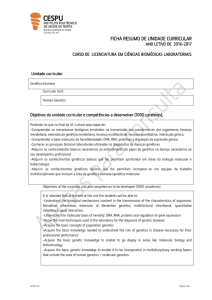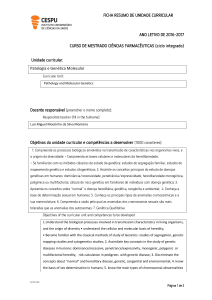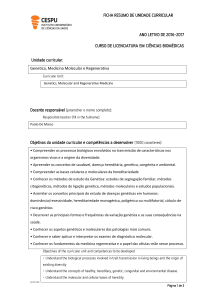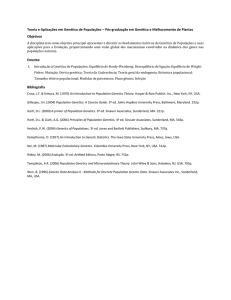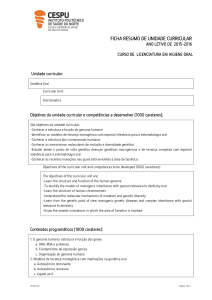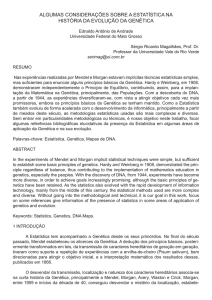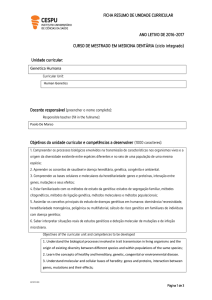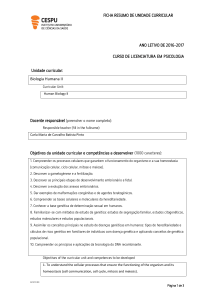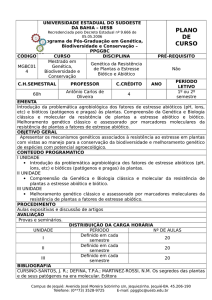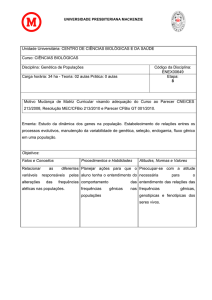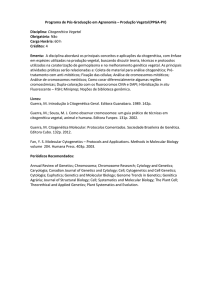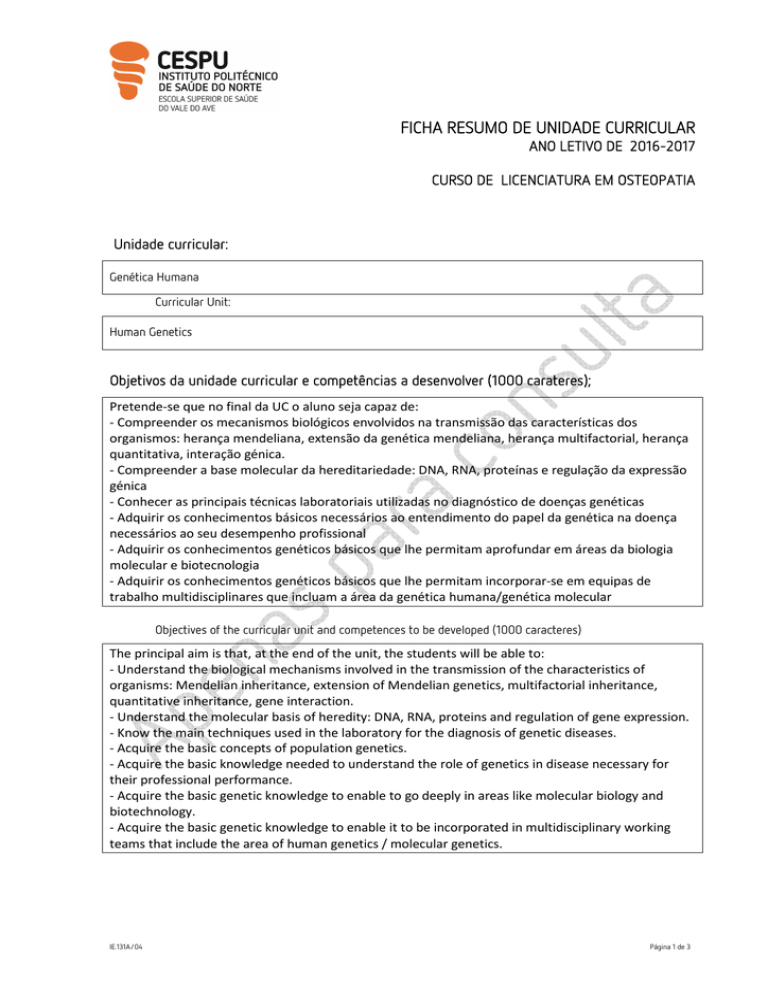
FICHA RESUMO DE UNIDADE CURRICULAR
ANO LETIVO DE 2016-2017
CURSO DE LICENCIATURA EM OSTEOPATIA
Unidade curricular:
Genética Humana
Curricular Unit:
Human Genetics
Objetivos da unidade curricular e competências a desenvolver (1000 carateres);
Pretende-se que no final da UC o aluno seja capaz de:
- Compreender os mecanismos biológicos envolvidos na transmissão das características dos
organismos: herança mendeliana, extensão da genética mendeliana, herança multifactorial, herança
quantitativa, interação génica.
- Compreender a base molecular da hereditariedade: DNA, RNA, proteínas e regulação da expressão
génica
- Conhecer as principais técnicas laboratoriais utilizadas no diagnóstico de doenças genéticas
- Adquirir os conhecimentos básicos necessários ao entendimento do papel da genética na doença
necessários ao seu desempenho profissional
- Adquirir os conhecimentos genéticos básicos que lhe permitam aprofundar em áreas da biologia
molecular e biotecnologia
- Adquirir os conhecimentos genéticos básicos que lhe permitam incorporar-se em equipas de
trabalho multidisciplinares que incluam a área da genética humana/genética molecular
Objectives of the curricular unit and competences to be developed (1000 caracteres)
The principal aim is that, at the end of the unit, the students will be able to:
- Understand the biological mechanisms involved in the transmission of the characteristics of
organisms: Mendelian inheritance, extension of Mendelian genetics, multifactorial inheritance,
quantitative inheritance, gene interaction.
- Understand the molecular basis of heredity: DNA, RNA, proteins and regulation of gene expression.
- Know the main techniques used in the laboratory for the diagnosis of genetic diseases.
- Acquire the basic concepts of population genetics.
- Acquire the basic knowledge needed to understand the role of genetics in disease necessary for
their professional performance.
- Acquire the basic genetic knowledge to enable to go deeply in areas like molecular biology and
biotechnology.
- Acquire the basic genetic knowledge to enable it to be incorporated in multidisciplinary working
teams that include the area of human genetics / molecular genetics.
IE.131A/04
Página 1 de 3
Conteúdos programáticos (1000 carateres):
AULAS TEÓRICAS
1-Genética mendeliana
-Herança dominante/recessiva
-Cruzamento monohíbridos/dihíbridos
-Árvores genealógicas humanas
2-Extensões da Genética mendeliana
-Dominância parcial, Codominância
-Alelos múltiplos e letais
-Herança influenciada pelo sexo
-Interação génica e epístase
-Herança mitocondrial
-Componente ambiental
3- Genética quantitativa
4- Ligação e mapeamento cromossómico
5-O genoma humano
-DNA e replicação
-RNA e transcrição
-Código genético, proteínas e tradução
-Organização do genoma eucariota
-Cromatina e cromossomas
6-Variação genética entre os indivíduos: mutação
7-Noções básicas de genética de populações
-Frequências alélicas e genotípicas
-Lei de Hardy-Weinberg
AULAS PRÁTICAS
-Exercícios sobre: genética mendeliana, extensões da genética mendeliana, genética quantitativa
-Exercícios sobre cálculo de risco em famílias
-Exercícios sobre genética de populações
-Protocolos laboratoriais para a análise molecular de ácidos nucleicos
-Análise de cariótipos.
Syllabus (1000 caracteres)
THEORETICAL LESSONS
1-Mendelian genetics
-Autosomal dominant/recessive
-Monohybrid/dihybrid cross
-Studies of human pedigrees
2-Extensions of Mendelian Genetics
-Partial dominance, codominance
IE.131A/04
Página 2 de 3
-Multiples and lethal alleles
-Inheritance influenced by gender
-Epistatic and gene interaction
-Mitochondrial inheritance
-Environmental component
3-Quantitative genetics
4-Linkage and chromosomal mapping
5-The human genome
-DNA and Replication
-RNA and Transcription
-Genetic code, protein and translation
-Organization of eukaryotic genome
-Chromatin and Chromosomes
6-Genetic variation among individuals: mutation
7- Basics of population genetics
-Allelic and genotypic frequencies
-Hardy- Weinberg Law
PRATICAL LESSONS
-Exercises on: Mendelian Genetics, Extensions of Mendelian genetics , quantitative genetics
-Exercises on: genetic risk calculation in families
-Exercises on population genetics
-Laboratory protocols for molecular analysis of nucleic acid
-Analysis of karyotypes
Referências bibliográficas (máximo três títulos):
-Passarge, E. (2007). Color atlas of Genetics (3rd ed). Thieme
-Klug WS, Cummings MR, Spencer C, Palladino MA. (2009). Concepts of Genetics. (9th ed). Benjamin
Cummings/Prentice Hall
-Lewis R (2008). Human Genetcs: Concepts and Applications. (8thed). McGraw-Hill
IE.131A/04
Página 3 de 3

